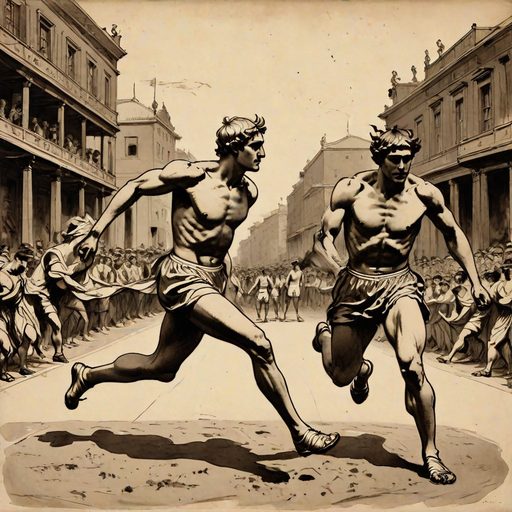
Olympic Games History: Exploring the Roots of Competition
Recommended for History
The Olympic Spirit: Blood, Sweat, and More Than Just Tears in Ancient Greece
Alright, dear readers, gather round. Let’s journey back to a time when the Olympic Games were more than just a global spectacle. We’re talking ancient Greece, where the sweat wasn’t just from the Mediterranean sun, and the tears weren’t always from joy. This wasn’t your average sports day; it was a clash of titans, a celebration of human spirit, and a glimpse into a world where athleticism was intertwined with culture, religion, and even politics.
Were the ancient Olympics really that different from today's?
Oh, yes, as different as a chariot race is from a Formula One Grand Prix!
Who could compete in those ancient games?
Not everyone. It was a privilege, not a right, with some surprising exclusions.
Did they really compete nude?
Yep, as bare as the day they were born, and we'll delve into why that was.
Sweat and Sacrifice: A Glimpse into the Ancient Olympic Arena
Picture this: Olympia, 776 BC. A dusty track, the roar of the crowd, and a lone figure sprinting towards glory. That first Olympic Games was a far cry from the multi-sport extravaganza we know today. It was a single footrace, the stadion, a test of pure speed and endurance.
As the centuries rolled by, the Olympics evolved. Wrestling, boxing, chariot racing – the Games became a proving ground for athletes from across the Greek world. Victory wasn’t just about personal glory; it was about bringing honor to your city-state. Winners were crowned with olive wreaths, symbols of peace and triumph, and showered with adulation upon their return home.
But the ancient Olympics weren’t all sunshine and laurel wreaths. There was a darker side, too. Unwelcome spectators faced the threat of execution – a harsh reminder that these were serious affairs. And for the athletes, the stakes were high. A loss could mean disgrace, while victory could elevate a commoner to the status of a hero.
Unveiling the Surprising Customs of Ancient Olympians
“Why the nudity?” you might ask. Well, lads, for the ancient Greeks, competing in the buff was a way to celebrate the human form, to strip away social distinctions, and focus purely on athletic prowess. It was a level playing field, quite literally.
But even this custom had its loopholes. Legend has it that a mother, disguised as a trainer, sneaked into the stadium to watch her son compete. Her ruse was only discovered when her son won, and she jumped for joy, revealing her true identity. This led to a new rule: all trainers had to be as naked as the athletes!
Women were banned from competing in the Olympics, but that didn’t stop them from making their mark. They could own chariot horses and bask in the glory if their steeds won. This loophole allowed a Spartan princess named Kyniska to become the first woman to win an Olympic victory, albeit indirectly.
The Rise and Fall: From Sacred Games to Economic Collapse
The Olympics were more than just a sporting event; they were a religious festival honoring Zeus, the king of the gods. The Games were held every four years, a time of peace and truce known as the Ekecheiria.
The Olympics also served as a unifying force for the fragmented Greek city-states. During the Games, rivalries were set aside, and a sense of shared identity emerged. It was a time to celebrate Greek culture, language, and traditions.
The Roman conquest of Greece in the 2nd century BC marked a turning point for the Olympics. While the Games continued for centuries under Roman rule, their prestige gradually diminished. By the 4th century AD, the rise of Christianity and the changing economic landscape led to their decline.
A Legacy That Endures
The ancient Olympic Games may have faded into history, but their legacy lives on. They inspired the modern Olympics, a global celebration of athleticism, unity, and the pursuit of excellence.
And while the modern Games may have their own controversies and challenges, they continue to inspire millions around the world, just as their ancient predecessors did thousands of years ago.
Watch a video
90 Seconds to Ignite the Spirit: The Olympic Flame’s Epic Journey!
Curious Times is a leading newspaper and website for kids. We publish daily global news aligned to your learning levels (also as per NEP 2020): Foundational, Preparatory (Primary), Middle and Senior. So, check out the News tab for this. We bring kids’ favourite Curious Times Weekly newspaper every weekend with top news, feature stories and kids’ contributions.
Curious Times News Program for Schools for FREE. Over 5,000 schools and teachers from all over the world have joined our programme so that students and teachers can get FREE Educative Newspaper. Here, kids can take part in world events and win prizes and certificates for free through their schools.
The following social media platforms allow you to communicate with us: Instagram.
0 (Please login to give a Curious Clap to your friend.)
